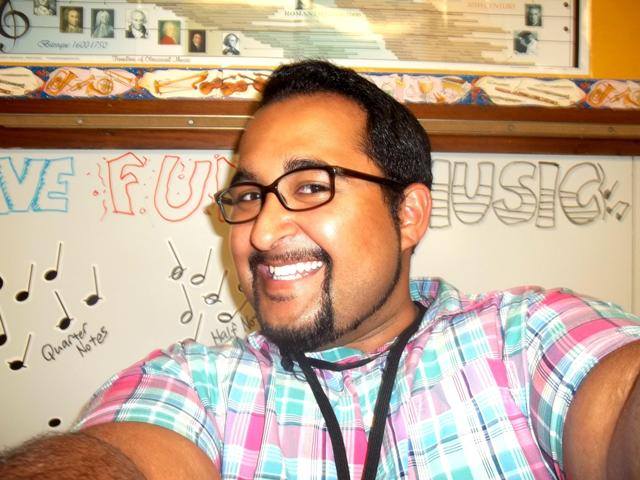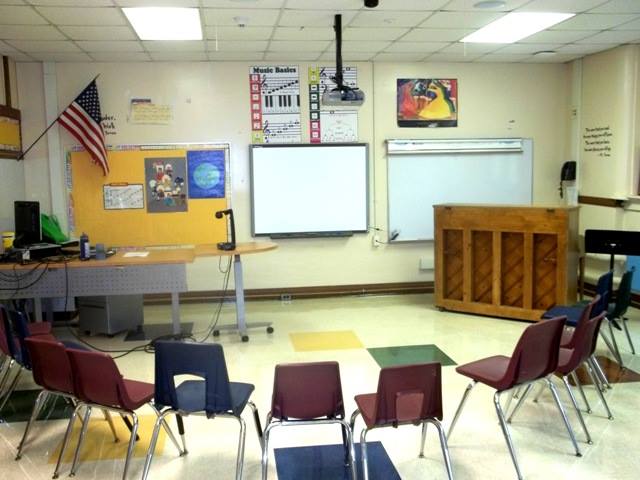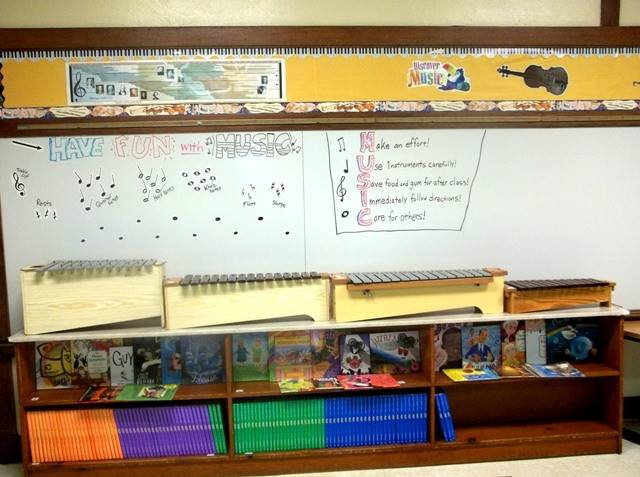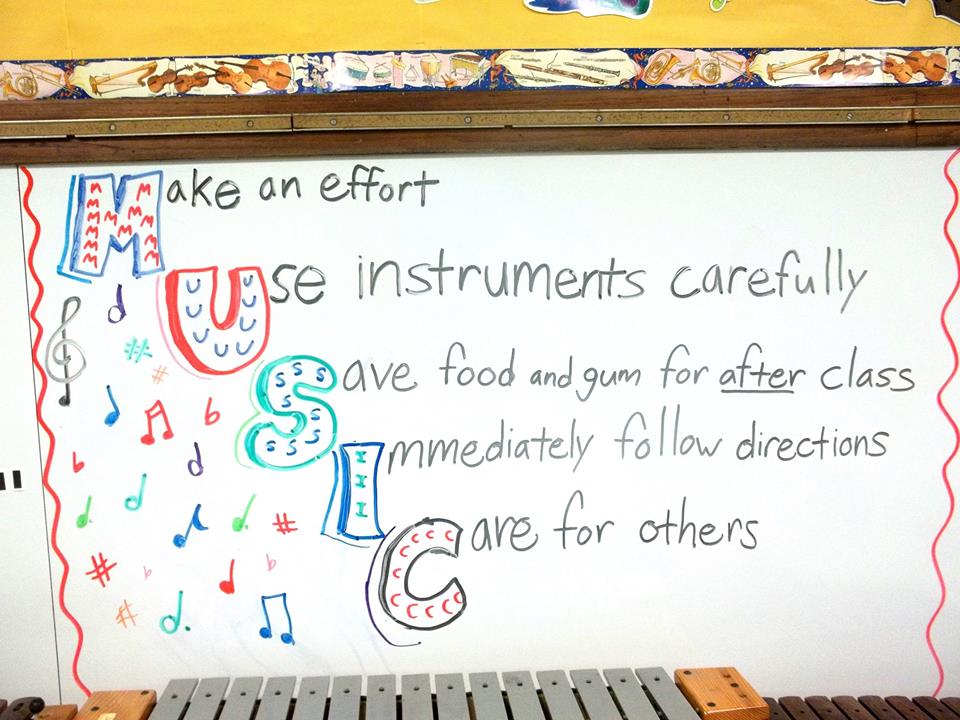with Jeremy McIntyre, tenor, and teacher at the Edison Environmental Science Academy and Greenwood Elementary School.
By Natasha Barbieri

Typical Day in the Life:
8:20 – 9:20 AM. 5th Grade General Music Class
9:25 – 9:55 AM. 2nd Grade General Music Class
10:00 – 11:00 AM. 4th Grade General Music Class.
11:00 – 11:45 AM. Plan Time
12:00 – 12:40 PM. Lunch
12:40 – 1:10 PM. 1st Grade Music Class
1:15-1:45 PM. Kindergarten Class
1:50 – 2:20 PM. 2nd Grade Music Class
2:25 – 2:55 PM. Second Kindergarten Class
I first met Jeremy when we both were students at Andrews University. From pedagogy classes, long choral rehearsals, master class and opera scenes performances we spent a lot of time together. We initially bonded over a love for musical theaters, “GLEE” and later “SMASH”, and became good friends especially my final year. Jeremy’s powerful tenor voice was always distinctive as was his passion for music. With his friendly personality and commitment to excellence, he was a standout candidate for a career in music education. It was fun to catch up with him and discuss a little bit about his life now… but first, let’s start at the beginning.
“I started singing originally, because of my mom. My mom is a singer and when I was small, she did a lot of singing up front at church.” Her influence as well as the music of the Christian group known as The Gaither’s not to mention several “Disney” inspirations, inspired Jeremy to give it a try himself. “I was just sitting in my room one day, I think I was probably in the fifth or sixth grade, and I kind of realized that I could carry a tune – possibly a little better than the next person.” I chuckle here, “possibly” is more than right. “I went to one of my friends who was good at playing the guitar and I was like ‘Hey I want to try something out with you, how does this sound?’ and he really liked my voice. I dived in from there.” He learned immediately the value of being encouraged from a young age and by his friend helped introduce him to others in the local music circle. “(My music experience) really just went off from there.”
A good teacher was the next step in his vocal development. “Growing up I was very much exposed to Broadway, thanks to my elementary school music teacher at the time. Even though I grew up in a Christian environment Ms. Whidden was really good at bringing in a lot of other influences, she didn’t just stick to Christian standards – and I really appreciated her for that.” Jeremy grew up with The Wizard of Oz, The Wiz, Annie and Joseph and the Amazing Technicolor Dreamcoat (I still remember his inspiring performance of ‘Close Every Door To Me’).

Jeremy attended Andrews Academy where the school featured a musical every other year. “In high school, I was involved in ‘South Pacific’ (sophomore) and my senior year I played the villain in ‘Honk’ which is sort of a lesser known musical based on the ‘Ugly Duckling.’ I played the evil cat.”
When it came time to go to college Jeremy decided to attend Southern University. “I needed a change,” he explains. “So I took off to Tennessee.” As much as he loved music, he didn’t plan on studying it at first. “My dad had kind of influenced me to start a counseling degree within social work because he was a psychologist himself. I went through that first year and I thought ‘This is Ok.’” But something was still missing. A lot of Jeremy’s friends had decided to attend Andrews University and he would visit them and hear their recitals. “The music program, especially at Andrews, attracted me a little more than the music department at Southern. It just seemed like their (Andrews’) department was a little more developed. I thought ‘this is something I would really like to get into and be a part of because even though I was in social work at Southern, I was still involved in music by taking voice lessons. I had made sure to keep my hand in the world of music with choir and voice lessons. And I just needed someplace that was a little more developed.” Finding the right program is an important step for any musician. However so is the reality of providing for yourself after college. “[I thought] I really want to delve into this program, but I needed to be able to have something to fall back on. I wanted to have the security of a job and the ability to still inspire people. As I was looking through options I thought, what if I do a degree in Music Education? I had spent several summers at F.L.A.G. camp unofficially teaching music to kids and I thought, ‘this is something I really could appreciate.” Jeremy continued to carefully research before committing to a career in Music Education. “Eventually as I researched several aspects of it, I thought YES, Music Education! Because I could be involved in music and be able to soak up as much about music from the program as I could; music theory, music history etc. and I could also have a degree to teach plus still be able to inspire. I think that was my bottom line; To have music as an inspiration in my life and work a steady job.”
While in the Music Education program at Andrews, Jeremy took every opportunity that was offered to perform. From solos in the select choir to opera scenes and roles, and leading the praise teams at church, Jeremy grew a reputation as a fine singer. He also pursued other avenues for performance auditioning for The Voice, GLEE and Pitch Perfect. “It’s a big process and there are millions and millions of people who also want what you want, so you are lucky even to get a little further through the many processes. But it was nice even to be in the environment along with other singers and it was just fun to be part of it all. And then the Pitch Perfect opportunity came along. Mike Tompkins, a youtube personality, does a lot of acapella singing on his channel and he was sponsored by Pitch Perfect to do this ad campaign on youtube.” The ad was for singers to send in videos recording the various parts and solos. “I sent in myself doing the lead vocals part and I had no idea if I was going to be in it or how many people were going to be a part of this video he was planning on making. As it turned out, many people made it in, but there’s a really cool part where you can see me on the screen and hear my voice and it was pretty cool to make it in there. The video was featured on youtube. And then later I heard it was actually going to be part of the Pitch Perfect DVD and I thought ‘Whoa that’s crazy!’ So it was kind of cool to have at least some publicity on the DVD of the movie.” All of his friends were quite proud to see him in the video.
So who inspires Jeremy to sing? “Musical inspirations come from a lot of different places… Growing up I listened to Josh Groban quite a bit. I also loved Judy Garland’s voice as well. I was in awe of her when I was little because (in The Wizard of Oz) she was so young and yet she had this big voice and I thought ‘How does she do that?’ Some of my other inspirations are Adam Lambert and Jeremy Jordan – I really like their ranges and their voices. Those are favorite male voices of mine. Of course I love Lea Michele because of all the feeling she puts in her voice as well as Jennifer Hudson. Also, Julie Andrews, Diana Ross, Justin Timberlake, Idina Menzel and Michael Buble just to name a few more. As time went on and I saw more people I had a lot of different inspirations for how to sing and how to present myself. Audra McDonald – I think her voice is amazing! I first noted her on the Disney TV version of Annie back in 1999, and I liked how she was able to mix Broadway and still have that strong kind of opera vocal ability.” He is quick to add his original inspiration to the list. “And of course my mom! A lot of my vocal patterns when I first started were inspired by her.”

The Music Education program is an intensive one where students are practically perusing a dual degree; one in music and one in education. Music Education majors take all the same fundamentals as other music students do, music theory, music history, ear training, ensemble, private voice lessons, and juries to name a few courses. In addition to these classes, Music Ed majors are expected to take classes in pedagogy not only for their main instrument but also the various other instruments in general music ensembles. They also take classes about choral and instrumental literature and music education methods as well as other general education credits. When their classes are complete, education majors must pass several tests in general education knowledge plus their specific area of teaching not to mention passing a semester of student teaching.
“Right now I’m teaching K-5; kindergarten all the way up to 5th grade. Throughout each week I see about 3-4 classes from each of those grades.” Music Education majors are expected to become certified all the way up to secondary (high school). “I’m basically the general music teacher and there is a wealth of things I cover from theory to music history, small Orff instruments, drums, and xylophones. We also rehearse various songs that we are getting ready for our concerts, so the students are learning vocal technique as well as how to present themselves as performers. So basically when students come into my classroom, each class under the heading of 3rd, 4th and 5th grade I get to see for an hour and then each class under the heading of K, 1st and 2nd grade, I get in 2 increments of 30 minutes. Each class is just a variety of what I described.”
What are some of the important qualities an individual should have in the Music Education profession? “I think one of the most important qualities someone needs to have would definitely be confidence in their subject matter and the confidence to simply stand up in front of people intelligently. Each day you almost have to put on a show because you are in front of as many as 20-30 students. Each student represents a home background and personality and you have to be ready to be up front and handle all 20-30 of these personalities! Not to say that each one is bad at all, but on the other hand, you have to be willing to have the stamina to be able to handle that for that full class period. You really need to know what you are doing and have stability with being in front of people. Another aspect is having a good plan for behavior management. You need to have an incentive plan to get them to sit down and be motivated.” This is especially important when it comes to music classes. “Unfortunately, especially in grade school, music classes get the title of the ‘fun’ class where the child may think that they don’t have to pay as much attention as they would in, say, math or reading or science. It tends to be simply the ‘fun’ class to several. Some tend to come to class and feel that they want to do whatever they feel like, but it takes a firm, yet kind stance to let them know that ‘hey, you’re still a student and in a class.’ Music is fun, but they have to remember, they are still in school.” Ultimately it takes someone who is truly devoted and excited about what they are doing. “The bottom line I believe is just a love for your students and a love for what you are doing, in this case, music. When you see your students in class every day, you have to say to them mentally, ‘I want to inspire your life today, to be someone who helps you see that music isn’t just that something as simple as that rap song on the radio, but that it’s something that’s so much more and you can truly be a part of it. I want to inspire you today’. You really do have to have an appreciation and a strong desire to inspire the faces that are sitting in front of you each day.”
Jeremy’s teaching mission also reads as a wonderful statement for future music teachers. “Be an inspiration, know your students and allow yourself to be the doorway to any and every type of music for them. Allow yourself to be that exploration guide who leads them into the world of music. Take them out of the mindset that music has only one or two genres or types and allow them to walk with you down each and every hallway that makes up the entire world of music!”
So exactly how much downtime does a music teacher really have? Is there really enough to pursue a performance career on the side? “As a new teacher, I have to work up to a certain amount of professional development points as well as attending workshops etc. Along with that, I am also going to be doing some teaching and private music lessons over the summer,” Jeremy continues, explaining that summers aren’t exactly free. “Living in Kalamazoo, there are quite a few opportunities to pursue performing. I’ve gotten the chance to perform at weddings and churches more recently but still not nearly as much as when I was in college.” During the school year, however, it can be exhausting. “As a teacher, the days (especially the last ones of the semester) can get a bit tiring, so you’re almost not quite as motivated to get out there… It really comes down to the question; does your motivation give you the push to still get yourself out there? You really just need to have that drive. I love performing and I’d love to get out there much more than I am. After having taught for 2 years, I think I kind of have a better hold of things and plan to get out into the musical performance scene more.”
What are some of Jeremy’s musical ambitions? “Well, I plan on teaching at least a couple more years. The very first day I got there, the school I teach at told me that no music teacher has lasted more than 2 years, so I’m going to outlast those others with at least one more year! But as far as musical ambitions go, if I have an open door or opportunity, I really want spend a year just going to a city somewhere (preferably New York) and finding an amazing music scene and just being able to perform. I’d love to see if that’s a venue I would feel comfortable breaking into.” That’s not to say that Jeremy would change his decision to become a music teacher. “I love teaching and I love the act of just being a music teacher and when I get older I want to fall back on that again, but at this point, I’m in my late 20s and I don’t want my end game to stop at simply teaching. I really do have a desire in me to get out there and perform much more. Not even necessarily to become famous, but just to be in a performance scene and be able to get my name and sheer expression out there. I definitely want to think a little more, shall we say, outside of the classroom in the next year or two.”








